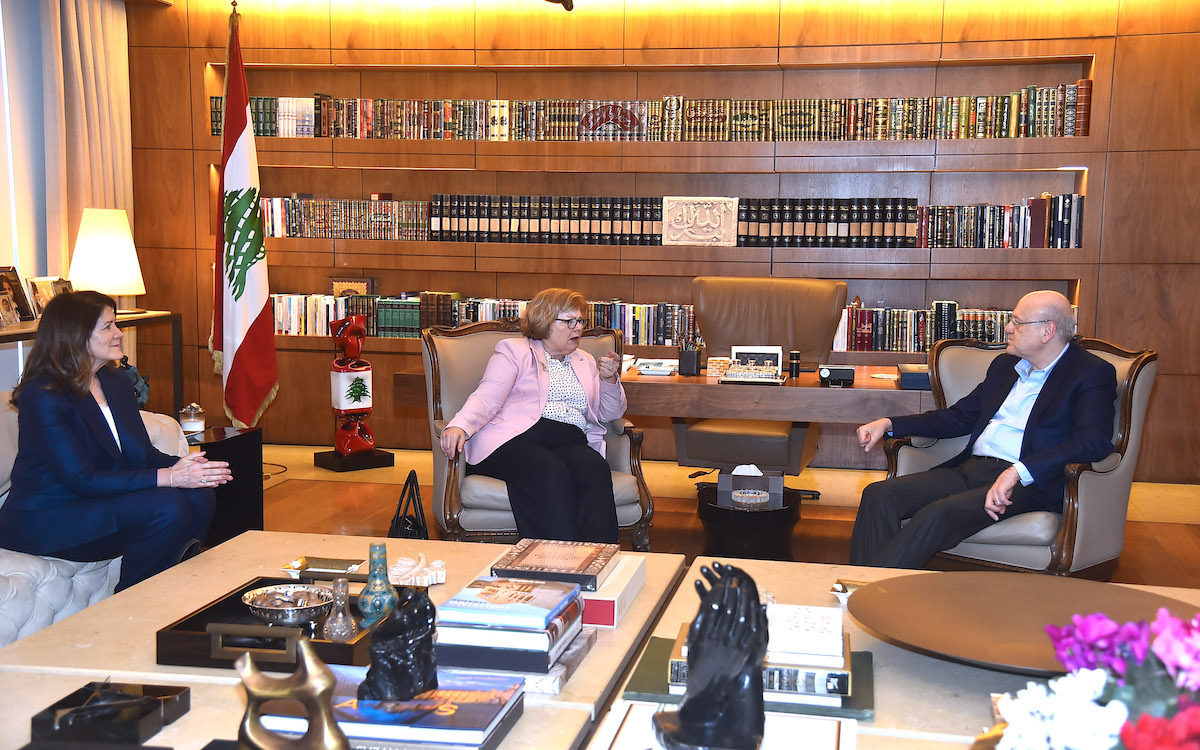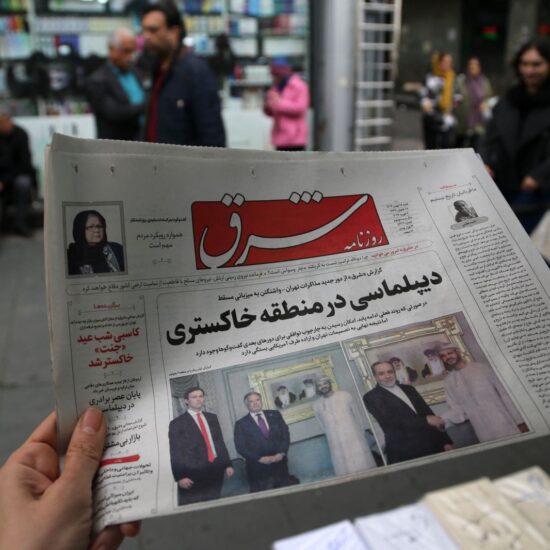
After six months, Lebanon is still yet to elect a president, with the most recent vote in Parliament having taken place on January 19, marking the 11th time that the legislative body has failed to agree on a candidate.
Since then, there has been political jockeying amongst the various political factions in the country, as well as calls for dialogue so that a consensus can be reached on who should succeed Michel Aoun after he left the Presidential Palace in Baabda following the end of his six-year term as president on October 31, but little to nothing has come from all the talking.
Instead, after Hezbollah publicly announced its support for Marada Movement leader Sleiman Frangieh on March 6, Free Patriotic Movement leader and presidential hopeful Gebran Bassil denounced Frangieh’s candidacy while promoting himself as the only solution to the current deadlock. Opposition parties, such as the Lebanese Forces and the “change” MPs, have continued their call for a president who can implement the necessary reforms to begin leading Lebanon out of the crippling economic crisis now in its fourth year. But this is also all talk, as the opposition remains divided and unable to back a single candidate.
Outside of Lebanon, the international community, in particular France, the United States and Saudi Arabia, have continued to express their dismay at the most recent political deadlock Lebanon is facing and have called for the quarreling parties to come together for the betterment of the country and elect a president.
However, outside of these statements, the international community has done little to incentivize Lebanon’s political elite to come to the negotiating table and end the deadlock, calling into question the influence that countries like France, which have been traditional patrons of Lebanon, have on Lebanon.
“Right now, there’s just no sufficient pressure on this political elite to form a government because the sad truth is that they can keep doing their daily business without a functioning government,” Anna Fleischer, director of the Heinrich-Böll Foundation’s Beirut office, told NOW. “If there was any real pressure from inside the Lebanese political class to say ‘Okay guys, without a functioning government I can’t conduct my business, I can’t go on,’ then there would be an intrinsic motivation but it seems that there is not.”
All carrot and no stick
Lebanon has long had close relationships with significant players in the international community with presidents and prime ministers often visiting France, Lebanon’s former colonial rulers, the US and Gulf Arab countries like Saudi Arabia.
These same countries have often acted as peace brokers in Lebanon, helping to bring about the end to conflicts and political deadlocks, with one of the most famous instances being the Taif Agreement in Saudi Arabia which brought about the end to Lebanon’s bloody 15-year civil war.
While the international community has maintained a significant role in Lebanon for well over a century, Karim Bitar, a professor for international relations at Lebanon’s Saint Joseph University, told NOW that their role has never been so large that it impedes Lebanon’s sovereignty or that foreign ambassadors in Lebanon play an outsized role in Lebanese politics.
Lebanon, however, also drastically depends on these countries for financial support, with Washington being the single largest donor for Lebanon and its armed forces.
But when this aid has strings attached, the Lebanese government begins to falter.
In the wake of one of the worst economic crises that the world has seen in over a century, France promised to pull together donors to help finance the country’s recovery on the condition that Lebanon implement significant and meaningful economic and financial reforms.
Lebanon’s Parliament has continued to fail to do so and, as such, has not seen any international aid.
These people have experienced very different circumstances and, therefore, it is in their political culture and how they work, it means that you need to take clear and concise action otherwise, yeah that was a nice speech but now what.
Even prior to the start of the economic crisis in 2019, Lebanon has often failed to meet the demands of its international backers, with the CEDRE conference being a prime example.
“They basically only happened because the Lebanese government was not happy about Brussels conferences that were the donor conferences on Syria and they put a demand to the French government saying ‘We also want our own donor conference. We’re footing the bill of the Syrian refugee crisis,'” Fleischer explained. “And, then, they all met in France and they agreed on all of these massive payments to help Lebanon, this is before 2019 mind you, but no payments have ever been made because no reforms have been implemented.”
According to Fleischer, this lack of action on the Lebanese side has to do with the international community itself, which is quick to make deals with the political elite but consistently fails to show them that there are any consequences, outside of expressing disappointment and frustration, when they ultimately do not follow through on their end.
Following the August 4, 2020 Beirut Port explosion, French President Emmanuel Macron visited Lebanon, where he chastised the political elite for allowing the disaster to happen.
The Lebanese politicians took the reprimand and then continued on as usual.
“This political elite literally grew out of a civil war,” Fleischer said.
“These people have experienced very different circumstances and, therefore, it is in their political culture and how they work, it means that you need to take clear and concise action otherwise, yeah that was a nice speech but now what.”
Even when the international community has made threats, they have had little sway over the political elite.
Nearly a year after the Beirut Blast, the European Union told then-President Aoun that the country’s political leaders were at risk of being sanctioned if they did not strike a deal with the International Monetary Fund to bail Lebanon out of the economic crisis soon.
But the political leaders called the EU’s bluff and, in the end, sanctions never came.
The US has also made similar threats, but instead of going after the political leaders, they have targeted only Hezbollah with sanctions, which has little effect on the group at this point and practically no effect on the other political leaders.
Even as Lebanon has remained without a president for six months and municipal elections have been postponed, a decision that could potentially be struck down in the courts leaving Lebanon with no municipal councils, the political elite seemingly remain unmotivated to come together and elect a president, despite the constant calls from the international community.
“Here [in Lebanon], talk is great but it doesn’t really mean anything. You need to take action in order to be taken seriously, especially by the leadership,” Fleischer stated.
Calls on deaf ears
Since Aoun vacated his seat in Baabda, the international community, primarily France and the US, has continued to issue statements calling for the election of a president who can lead the country out of crisis.
These calls have continued even in recent weeks and days.
On April 25, a bipartisan letter sent to President Joe Biden by US senators Bob Menendez (Democrat-New Jersey) and Jim Risch (Republican-Idaho) expressed their concern for the “ongoing political stalemate” in Lebanon and the need for the country to elect a president.
A statement from the US State Department on May 1, which marked six months since Aoun left office and the second-longest presidential vacancy in Lebanon’s history, also called for Lebanon to quickly elect a president.
US Representatives Joe Wilson (Republican-South Carolina) and Dean Phillips (Democrat-Minnesota) also released a joint statement also calling for an end to the stalemate and for a president to be elected.
All of this, though, does not seem to have moved Lebanon’s politicians much as the deadlock continues unabated and with no end in sight.
However, the US has not shown much interest in being closely involved in regional politics and has instead sought to distance itself from the quagmire, allowing the Europeans and French to take the lead.
The dialogue between the Europeans and Lebanon has had little to do with coming to a consensus on a president, and more to do with the issue of Syrian refugees in Lebanon, a group that Lebanon’s politicians have been more than happy to scapegoat to avoid taking any blame for the growing list of problems facing Lebanon.
While it is true that Frangieh is not Saudi Arabia’s favorite candidate, there is no Saudi veto. They are open to Frangieh. They want some guarantees but, at a time where they are reconciling with Bashar al-Assad and there is a détente with Iran, there is not a veto that is as firm as some of Saudi Arabia’s allies would want. They have given an orange light and they could end up supporting him.
Even Saudi Arabia, which in the past was heavily involved in Lebanon’s politics, has decided to take more of a backseat as the Gulf nation begins to focus on more domestic issues rather than get involved in regional ones, something that its recent rapprochement with Iran has offered them.
This does not mean that Saudi Arabia does not have a preference when it comes to who should be elected president.
When Frangieh’s candidacy was announced, it was reported that the Saudis not only rejected him but also threatened to fight his candidacy every step of the way.
According to Bitar, however, this opposition has been exaggerated and the Saudis may not be wholly opposed to a Frangieh presidency.
“While it is true that Frangieh is not Saudi Arabia’s favorite candidate, there is no Saudi veto. They are open to Frangieh,” the university professor explained. “They want some guarantees but, at a time where they are reconciling with Bashar al-Assad and there is a détente with Iran, there is not a veto that is as firm as some of Saudi Arabia’s allies would want. They have given an orange light and they could end up supporting him.”
When it comes to France, Macron has seemingly been pushing the idea of a compromise of Frangieh as president and Nawaf Salam, a Lebanese judge who is currently sitting on the International Court of Justice and is viewed as a reformer, as the prime minister. This deal has been opposed by the vast majority of Lebanese politicians.
Even if Frangieh is not France’s preferred president, it would help to moderately stabilize the situation in Lebanon, something that both Bitar and Fleischer say is important to France.
“When it comes to France, there are also strategic and economic interests but France is also very attached to the stability of Lebanon. Sometimes they focus excessively on short-term stability and at the expense of the long-term structural reforms that would bring real stability,” Bitar said.
Fleischer, though, questions what this so-called stability actually means at this point, as the economic crisis continues to worsen.
Despite Lebanon’s political elite ignoring calls from the international community, Bitar maintains that they continue to have sway in Lebanon and that it is the voices of the Lebanese people which have faded into the background, with the “real actors” being the “US, French, Saudi diplomats and, of course, Iran and Hezbollah.”
Hezbollah has continued to push for a Frangieh presidency and, as the Iran-backed group remains the most powerful player in Lebanese politics, it is nearly impossible for a candidate to be elected without at least their tacit approval.
The international community may keep putting out statements for Lebanon’s politicians to finally put an end to the stalemate and elect a president, but, without any concrete action, it is unlikely that the situation will change anytime soon.
Nicholas Frakes is a senior reporter with @NOW_leb. He tweets @nicfrakesjourno and on Instagram @nicfrakesjourno.








